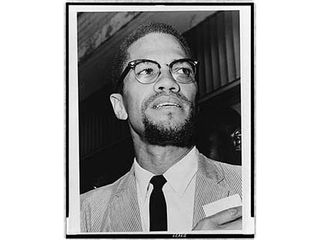Exploring a Civil Rights Legacy Through The Lost Tapes: Malcolm X


He used his voice — a deep, mesmerizing, reverberating baritone — to rouse and compel and sometimes shock a nation into action. The impassioned, ardent and controversial speeches that were at the heart of Malcolm X’s call to action were unlike anything those in the 1960s had ever heard before.
Now, a program airing on the Smithsonian Channel as part of the channel’s TheLost Tapes series — titled The Lost Tapes: Malcolm X — will explore the myth and life dichotomy of this civil rights leader.
Most compelling is the way in which the program’s storytelling may impact your own impression of this mesmerizing, impassioned, controversial young man.
The story of Malcolm X is mostly likely refracted back to most of us through a heavy filter of history, controversy and the legacy of other civil rights leaders. But the Smithsonian documentary offers viewers a new take: an un-narrated, real-time accounting of his life as it unfolded. The documentary charts the path of Malcolm as he attempts to make sense — and alter the path of — one of the most turbulent times in our nation’s history.
Starting Jan. 31, the documentary will be screened at a series of co-hosted red-carpet premieres in 16 cities across the nation, beginning at the National Museum of African American History & Culture in Washington, D.C. On Feb. 21, a special screening will take place at the National Black Theatre in Harlem where Malcolm X’s daughter, Ilyasah Shabaaz, will offer remarks about her father on the 53rd anniversary of his death. Community leaders, government officials and public figures will be in attendance at these events, including MVPD partners Comcast, Charter and Altice.
Real-time Storytelling Offers New View
According to David Royle, executive vice president of programming and production for the Smithsonian Channel, the unique filmmaking style of The Lost Tapes highlights a storytelling style that is both dramatic and has contemporary relevance. “The unique filmmaking style of The Lost Tapes really plays to [our] hunger [for authenticity],” he said.
Multichannel Newsletter
The smarter way to stay on top of the multichannel video marketplace. Sign up below.
Filmmaker Tom Jennings pulls together rarely-seen video footage, newly discovered audio tapes, newspaper headlines and, for the first time, newly public footage of Nation of Islam rallies that recreates key moments in time.
The documentary has neither talking heads nor any interviews, only short captions that explain the video and audio on screen. No one tells you how to think or what to believe.
It’s a modern way to explore history in the Internet age, Royle said.
The program examines the pivotal years of Malcolm X’s life, touching on his work as a minister and his time as a spokesperson for the Nation of Islam. It looks at his years as a student of Elijah Muhammad, who lobbied for the separation of African Americans from white society, and Malcolm X’s eventual disillusionment with that path.

Take the shocking audio recordings taken from within the Audubon Ballroom in Harlem on Feb. 21, 1965, when Malcolm X was assassinated by three gunmen who rushed the stage as he was speaking.
That first report, from an off-duty freelance radio reporter named Gene Simpson, was described as pandemonium.
“Shots rang out all over the place,” Simpson says in the unnerving original recording. “He’s now laying on the stage. He’s alive, but feebly.” Malcolm X died soon after.
For decades, those tapes had been locked away in a storage unit in Hawaii until they were unearthed and restored for the documentary.
Filmmaking that Charts a Difficult Path
Making the documentary in this way was not an easy process. But it was necessary for the filmmakers to depictthe way Malcolm X's ideas evolved over time — as opposed to letting the filter of history alter the view from 2018.
“The finished films are so enthused with drama that it looks easy, as if the stories just unfolded in some seamless outpouring,” Royle said. “But it’s difficult to accomplish this without using scripts or interviewees to explain what’s going on.”
“You can’t help but be impressed not only by his immense intellect but his charm and charisma, [and by] his humor and dazzling smile,” Royle said. “It's really fascinating to imagine what he would have accomplished if he had survived.”Footage within The Lost Tapes: Malcolm X, includes appearances of the activist that have never been broadcast before.
“The Lost Tapes: Malcolm X” will debut on Feb. 26 at 8 p.m. ET/PT on the Smithsonian Channel.
